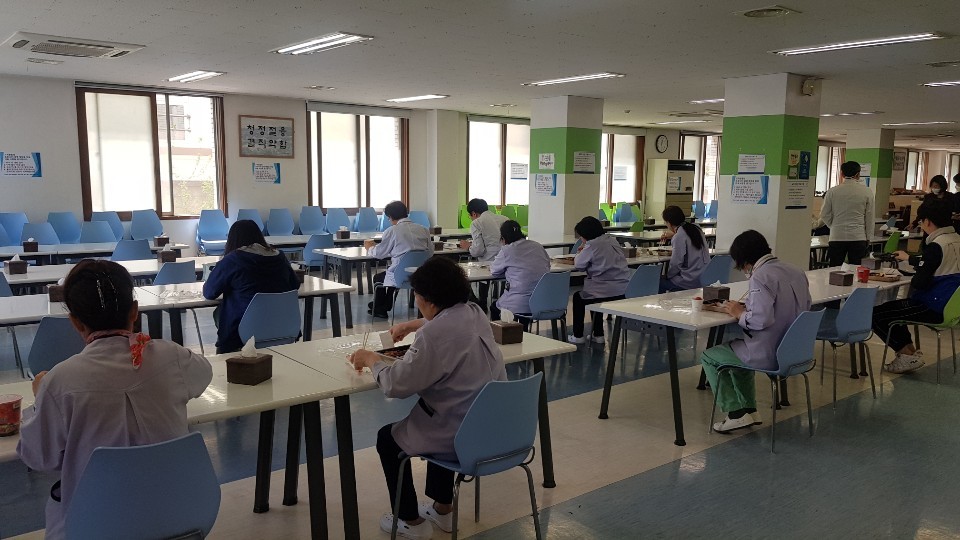[Weekender] New social norms emerge in the age of COVID-19
Changes may be here to stay, requiring people to adjust to the new reality
By Song Seung-hyunPublished : May 2, 2020 - 15:31

As the number of new COVID-19 infection cases continued to fall, the government began applying a relaxed social distancing advisory starting April 20.
Despite the eased guideline, many Koreans are still following “rules” that emerged following the virus spread.
“While taking our lecture using ‘Zoom,’ we have to wear earphones,” Kim Ki-wook, a graduate school student told The Korea Herald. He explained that if the online livestreaming lecture participants do not use earphones, the sound from the computer’s speaker can cause feedback for everyone listening.
“At first people did not know this ‘etiquette’ and it was hard to proceed with the lecture due to the noise,” Kim explained.
Kim also shared his experience meeting his classmates on online livestreaming platforms to get to know each other better.
“The new semester has begun but we have never met. In our class, we often give each other feedback on our assignment, so we all thought we needed time to get to know each other. During this meeting, we had to make sure to listen to the person who is speaking and not to talk simultaneously,” he said.
Office workers who still have to commute to work are adhering to more new social rules.
“A notice on our elevator says to wear masks and avoid talking,” said Cho Seo-jin, an office worker in Mokdong, Seoul said. “I saw a man talking on the phone without a mask a few weeks ago. Nobody said anything to him, but I noticed that everyone seemed uncomfortable.”
“When using the spray sanitizer at the entrance of our office, I also make sure that there is no one around before spraying it on my coat,” Cho added. He said there were no penalties for not following these rules, but since it is considered good manners, he and many of his colleagues feel a social obligation to follow them.
“Our HR team closely and regularly watches us. We were told to wear masks and sit one seat apart from each other when having meetings. Now most people follow. At first, many people took off their masks during meetings, but our HR staff quickly held up a smartphone screen that says ‘Please wear your mask’ against the meeting room window,” a local IT company worker said on condition of anonymity.
“Our team usually went out to dinner together at least once every other month. But since February, we have not done so because our company banned group gatherings after work hours,” said Yang Ji-ae, an office worker in Gangnam, Seoul. “We still eat lunch together as a team though. But nowadays no one asks others if they want to share food.”
Yang also asks delivery workers to leave the food they bring in front of the door after ringing the doorbell.
“I do this to minimize contact. I think this is good for both delivery man and me,” Yang said.
Since most etiquettes are aimed at minimizing contact and keep a distance, many experts see them as effective in preventing the new coronavirus from spreading.
“I think highly of the public following the new etiquette. Of course, some credit should go to the government and the medical personnel, but the public’s role was also important,” said Kim Woo-joo, a professor of infectious diseases at Korea University Guro Hospital. “I think this was possible due to the experience that people had from going through viruses such as MERS (Middle East respiratory syndrome) and swine flu.”
“New etiquette like pressing buttons with the back of your hands is great, since fingers and palms can carry and spread the virus more easily,” said Kim Dong-hyun, president of the Korean Society of Epidemiology and preventive medicine specialist at Hallym Medical School.
The experts also emphasized that along with the individuals following new social norms, it is also crucial for the society as a whole to make some adjustments for a future pandemic.
“There can be a second wave of the virus this winter. Some experts even say that the pattern of the pandemic can be repeated until 2024. So, the new way of living such as online lectures or meetings will likely become a normal thing for many. As a society, we should be ready for this,” professor Kim Dong-hyun said.
“Unless there is a vaccine (for COVID-19), it is important to adjust to the situation and have new etiquette. For instance, I think companies like Starbucks removing some seats and tables to make people maintain a distance from each other is a great idea,” professor Kim Woo-joo said. “Our hospital’s cafeteria also has acrylic boards installed between each seat like a library to physically block droplets from spreading.”
Looking farther ahead, some experts said that people will soon get used to the social norms and that this will soon make our society more individualized.
“For now, most people are at the stage where they want to go back to how they used to live and meet people in person. But if the virus goes on for long, like until the end of this year, people will soon get used to the new lifestyle and think that commuting to work or having an offline meeting is a waste of time,” Kwak Geum-joo, a psychology professor at Seoul National University, said. “But if this change is inevitable, it is important to gradually adjust to the situation. For example, learning to focus on work outside of the office can be helpful.”
By Song Seung-hyun (ssh@heraldcorp.com)











![[Today’s K-pop] BTS pop-up event to come to Seoul](http://res.heraldm.com/phpwas/restmb_idxmake.php?idx=644&simg=/content/image/2024/04/17/20240417050734_0.jpg&u=)





![[KH Explains] Hyundai's full hybrid edge to pay off amid slow transition to pure EVs](http://res.heraldm.com/phpwas/restmb_idxmake.php?idx=652&simg=/content/image/2024/04/18/20240418050645_0.jpg&u=20240419100350)

